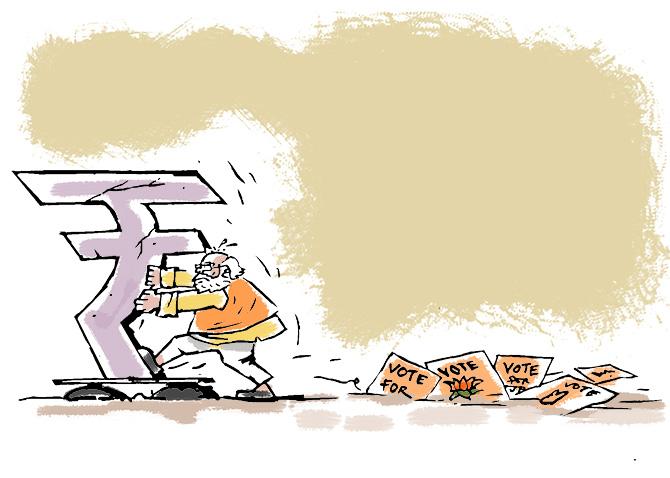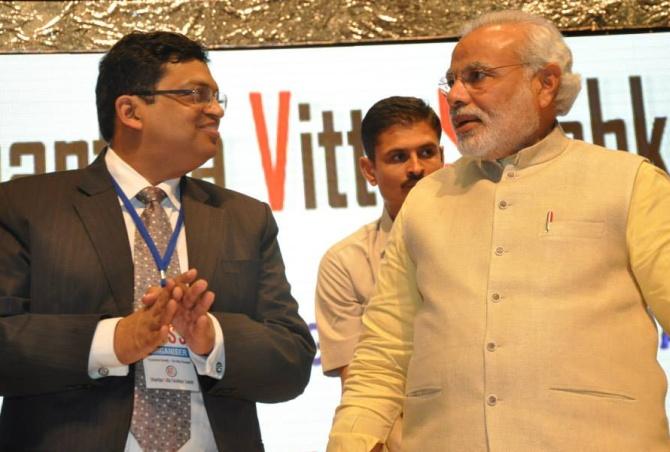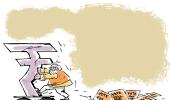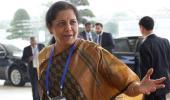'We have promised to ensure reduced tax rates.'

"The focus of all the steps would be to lower the effective tax rate for the payer and have a better compliance so that there is net increase in the tax revenue," the Bharatiya Janata Party's National Spokesperson for Economic Affairs Gopal Krishna Agarwal tells Aditi Phadnis.
The country is facing a challenging economic situation: A slowdown threatens, unemployment is at historic highs and manufacturing is at a standstill.
How does the BJP propose to deal with the situation now that it has come back to power? What should be its top priority?
It is wrong to say that the country is facing a challenging economic situation.
If you look at the macro-economic parameters, they all are in a very good shape.
Inflation is under control at around 4.5%. GDP is on a higher growth path, and is about 7.5%.
Fiscal deficit at 3.5% is under control. The current account deficit is also healthy.
Tax to GDP ratio has increased to 12 per cent. All this will allow the government to take necessary steps wherever required.
We understand that, if the economy has to grow on this strong foundation, we have to address many issues.
We also have many opportunities arising from the growing aspirational middle class.
This middle class has huge sums of money at its disposal for consumption and investments.
One important consideration is our focus to reduce poverty to a single digit.
The aspirational middle class and reduction in poverty will drive consumption demand in the economy.
The top priority for the government would be to revive private corporate investment, which has been low for some years now.
Once these engines work well, things like manufacturing growth and employment generation would be taken care of.
Our focus will be on the manufacturing sector, particularly micro small and medium enterprises, which we have termed as the missing link.
The government would be committed to take all the necessary supportive steps.

The goods and services tax has left enormous destruction in its wake. While it has formalised the economy, it has also increased the expenses of small businesses, and the potential of corruption.
There is nothing a small trader fears more than the word 'mismatch'.
Conceptually, no one has a problem with the GST. It does away with the multiplicity of tax structures, subsuming central, state and local taxes.
It results in a reduction of indirect taxes for the consumer, creates ease of doing business by online registration, filling of returns and assesment and creating one tax one market.
For the consumer, it would reduce prices of manufactured goods, for the government, it would mean increased tax collection and fiscal consolidation and creation of a much simpler system to administer through GSTN network.
Small businesses with aggregate annual turnover up to Rs 40 lakh are exempt from GST.
And those having annual turnover up to Rs 1.5 crore can avail the benefit of composite scheme by paying 1 per cent tax and get rid of GST formalities.
Fear of mismatch is an initial hiccup, but is necessary to clean the indirect tax structure.
It penalises those who collect taxes, but do not deposit it to the exchequer.
Without the complete audit trail, the gaps in the tax collection can't be filled.
To overcome initial problems of mismatch, the government has been lenient and has allowed input tax credit on provisional basis.
But ultimately the black sheep in the system have to be weeded out.
India with such diverse income groups can't have a single rate GST.
We plan to integrate 12% and 18% GST slabs into a single 16 per cent rate with majority of items falling in this category.
Only six items termed as sin goods remain in the higher 28% slab. Essential commodities, mostly food items, are under the 5% tax slab.
With 30 GST council meetings, most of the demands for simplification have been accepted, like reverse charge.
Anti profiteering provision has a sunset clause. And still if more modifications are required, the government is open to those suggestions.
You have in the past expressed clear views about the role of the Reserve Bank of India in helping kick-start the economy. What should the RBI do now?
There are two issues with the way the RBI has conducted its monetary policy and banking regulation.
First is that the monetary policy committee has always overestimated future inflation in the economy as a result of which RBI has kept the benchmark interest rate at an elevated level.
This was clearly not warranted by the level of economic activity in the economy.
Second, whenever the RBI cut the repo rate, it was not fully transmitted by the banking sector.
As a result of these two factors, investors in India face one of the highest real interest rates in the world.
Though we see an improvement in these areas in recent times, I would want the RBI to continue working on these two issues.
If they are taken care of, other pieces of the financial sector puzzle will fall in place and the real economy will benefit.
The government and the RBI are working to resolve the issues at IL&FS and some NBFCs.
The banks underwent cleansing via prompt corrective action or PCA.
Six banks are still under PCA, they have to be corrected through bank mergers or infusion of capital. We don't need 27 public sector banks.
What are the direct tax reforms on the anvil?
The new government will present its first Budget in July 2019. We are waiting for the report of the task force on direct tax simplification.
Corporate tax has to be brought down in line with withdrawal of exemptions and incentives.
Even basic income tax exemption limit has to be increased from Rs 3 lakh to Rs 5 lakh. We have promised to ensure reduced tax rates.
Earlier, the government had launched email-based assessment.
This facility was included in e-filling portal. Later, the Central Board of Direct Taxation directed all cases barring certain exemptions to go for E-assessment.
We would follow it up. E-assessment will help in removing widespread corruption in the direct tax structure.
It will smoothen the process and remove subjectivity. Income tax notices etc will be generated through the central database.
The focus of all the steps would be to lower the effective tax rate for the payer and have a better compliance so that there is net increase in the tax revenue.
Should we expect another round of populist spending?
Your question presupposes a previous round of populist spending, which is not true.
In the current term as well, there would not be any populist spending.
Indians will have to understand the concept of tax payer's money and its sanctity.
These are governance issues involved with the exchequer.
The government is the biggest borrower. Giving out doles, with this money will be inflationary and fiscal deficit will rise.
If the government borrowing is used for asset creation, it expands the economy.
When we say that in the next five or 10 years, we will go for Rs 100 trillion of investment into infrastructure, it is sustainable and will help economy.
In fact, our focus has been on increasing the efficiency of government expenditure.
For example, better targeting through Jan Dhan accounts and direct benefit transfers.
We did not announce farm loan waiver in our manifesto and still won with such a huge majority.
We believe that good economics is good politics.
What should be the new government's immediate big idea on economic management?
Financial resolution and deposit insurance has to be implemented.
We also need development financial institutions to finance long-term gestation projects. We will certainly do that.
Big-ticket reforms in the factor market mobility like land, labour and capital is very important for the industrialisation of the country and would step in that direction.
The Centre is pushing for digitisation of land records and land lease agreement; it is helping in establishing ownership of land.
On the labour front, there has been efforts on the formalisation of labour. 93% of our labour force is in informal sector.
The working conditions in this sector are very poor. Provident fund, ESI, job security, social security etc are not available.
The government has plans for consolidated labour code and promote fixed term contracts.
There is stress in the agricultural sector. Food grain production in the country has moved from shortages to surplus.
But the agricultural policies are still being formulated with a deficit mindset. We will drastically change this.
Earlier, all our commodity import export policy was aligned with the requirement of consumers.
Our import export policies are being aligned to ensure that the farmers get better price for his produce.












 © 2025
© 2025